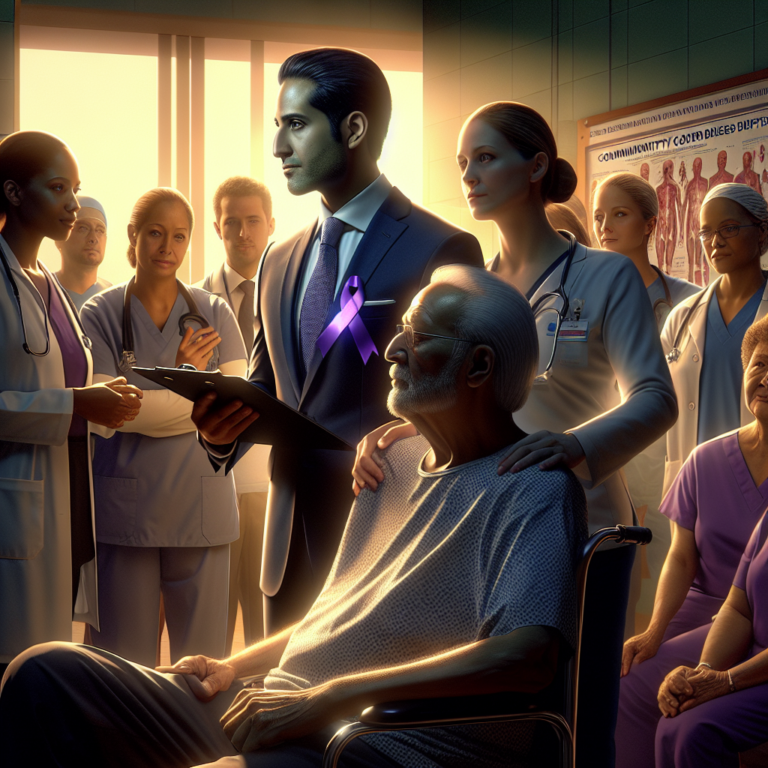Navigating Continuous Care: Your Guide to PNET Treatment and Support

A Journey Through Pancreatic Neuroendocrine Tumors: Robert Girdwain’s Story
In the summer of 2019, Robert Girdwain noticed a surprising change: he lost 10 pounds without any effort. Alongside this weight loss, he experienced significant gastrointestinal issues, prompting him to consult with his gastroenterologist, Dr. Jeff Victor, at Northwestern Medicine in Chicago. What initially seemed like irritable bowel disease (IBD) took a life-altering turn when a CT scan revealed a tumor in his pancreas.
A Life-Changing Diagnosis
On August 8, Dr. Victor delivered the shocking diagnosis: a pancreatic tumor. Following this, Robert met with Dr. Rajesh Pillai from Advocate Health Care, who confirmed that the tumor was indeed cancerous. Faced with the grim reality of pancreatic cancer, Robert felt hopeless and even prepared for the worst, sharing his funeral wishes with his wife.
Exploring Treatment Options
Despite the bleak outlook, hope emerged when Robert consulted with Dr. John Abad, a surgical oncologist, and his primary oncologist, Dr. Christopher George, at Northwestern Medicine. They diagnosed him with a stage III pancreatic neuroendocrine tumor, a relatively slower-growing and less aggressive type of pancreatic cancer. This revelation sparked a flicker of optimism; surgery was a possibility, and it could potentially cure the cancer.
On September 9, Robert underwent a distal pancreatectomy and splenectomy, a complex operation lasting over six hours. The procedure removed 80% of his pancreas but left microscopic cancer cells behind. While chemotherapy and radiation weren’t initially recommended, Robert began a strict monitoring regimen, including blood tests every two weeks and CT scans every three months.
Adjusting to Life After Surgery
Living with only 20% of his pancreas came with challenges. Robert now needed to take digestive enzymes with every meal and manage new-onset diabetes, requiring daily insulin injections. His diet underwent a drastic change, eliminating many of his previous favorites.
The Return of Cancer
For the next six months, Robert’s follow-up scans showed stability. However, after Easter 2020, he experienced concerning symptoms, including bright orange urine and jaundice. A hospital visit revealed a blocked bile duct caused by another tumor. This unexpected complication led Robert to the University of Chicago, where he consulted oncologist Dr. Chih-Yi “Andy” Liao and surgeon Dr. Xavier Keutgen, experts in gastrointestinal neuroendocrine tumors.
A New Treatment Path
The doctors recommended starting oral chemotherapy with capecitabine and temozolomide, which Robert tolerated well for 14 months, managing only mild side effects. Although the treatment was effective, long-term chemotherapy posed risks, leading to a switch to monthly hormone injections of lanreotide. Unfortunately, after three months, it was clear that this treatment wasn’t sufficient to control the spread of cancer to his liver.
Tackling Liver Tumors
In December 2021, Robert underwent embolization of the liver tumors, a successful outpatient procedure aimed at cutting off the tumor’s blood supply. Following the procedure, his doctors noted that the liver tumors appeared “dead” with scarring. If future tumors arise, Robert has a potential treatment option in peptide receptor radionuclide therapy (PRRT), a targeted molecular therapy for neuroendocrine tumors.
Living Life to the Fullest
Though deemed incurable, Robert’s cancer is manageable, and he continues to lead an active life. He enjoys wrestling with his grandsons, taking daily walks with his wife, Carol, and even exploring oil painting. Carol has been a steadfast supporter throughout this journey, emphasizing the importance of having a dedicated advocate during challenging times.
Reflecting on his experience, Robert has learned to cherish each day, finding joy in life’s small moments. His journey has deepened his spiritual connection, reinforcing the belief that life is a preparation for eternity.
For more information on pancreatic neuroendocrine tumors and treatment options, visit Northwestern Medicine or Advocate Health Care.






